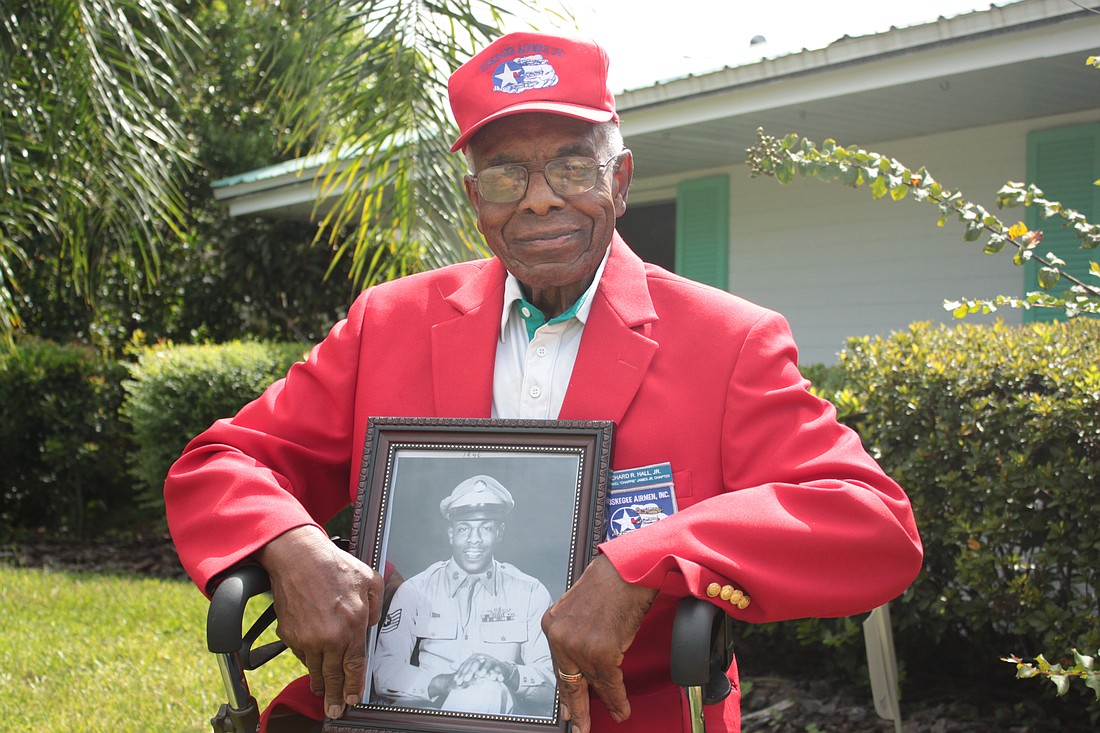- April 16, 2024
-
-
Loading

Loading

Richard Hall Jr. was one of only three Winter Park African-American graduates that year to continue their education after high school, all at the Xavier College in New Orleans. He and his brothers were known as the “country boys from Winter Park,” but that wouldn’t last long. Just a few short years after he left for college, he’d be shipped off across the world.
Hall, who joined the U.S. Army reserves at the advice of administrators as his college, was drafted to fight in World War II when he was 20 years old. He was quickly chosen as one of the elite Tuskegee Airmen for the Army Air Corps and fought in Europe.
The Tuskegee Airmen are part of a pivotal point in history. These very special men were the first African-American military aviators in the U.S. At that time, the U.S. military was racially segregated, and the Tuskegee Airmen were no exception, but they were still overseen by white officers.
Training was rigorous, and only the best were chosen. But Hall found flying came naturally to him. Landing was a bit tough, but the taking off that many had a hard time with, he did with ease.
“Flying came easy for me,” the 88-year-old Maitland resident said. “It felt good.”
This month, Hall will share his experiences at the Holocaust Memorial Resource and Education Center’s new exhibit, “The Civil Rights Struggle, African American GIs, and Germany.” The exhibit details the huge part African-Americans played in ending WWII, which hasn’t gotten much attention. Even then, their sacrifices were ignored.
To mark the opening of the Holocaust Memorial Resource and Education Center’s new exhibit, “The Civil Rights Struggle, African American Gis, and Germany,” the Center will have a reception Sept. 23 at 2 p.m. and will feature two local Tuskegee Airmen, including Richard Hall Jr. The exhibit will have speakers and events through its term at the Center, visit holocaustedu.org or call 407-628-0555 for more information.
“African-Americans have been full citizens of the United States for a century and a half, have had the same responsibilities and the same obligations, but without the same recognition and the same power,” said Susan Mitchell, the director of special projects for the Center. “For many years (the Tuskegee Airmen) were almost a forgotten part of history.”
Until recently, when a 2012 film called “Red Tails” told the story of these pioneering men to a whole new generation, she said.
For many reasons, this display fits perfectly into the mission of the museum — being on the side of justice and never turning a blind eye to prejudice.
“There are parallels in history, that the kinds of dynamics that led to the Holocaust were also dynamics that led to — in a different extent and a different time — Jim Crow laws,” Mitchell said. “It’s a distrust of people that you don’t know and you don’t understand, it’s the cultural biases that we grow up with that we don’t even think about.”
For the African-Americans who fought in WWII, what they experienced changed their whole world. For the first time, whites and blacks were working — fighting for their lives — side by side. African-Americans gained valued skills in the military, including the courage and confidence to take their war experience and use it as motivation back home.
“They were faced with the irony of it all — they sacrificed their time, energy, body parts and often lives to fight racism in Germany, and then they came back and it was still the 1940s and the 1950s, where segregation was very evident, very obvious, very legal and very deadly,” Mitchell said.
Hall recalls it very well. When he came home after the War, his orders to go to Kentucky were quickly changed to Ohio after race riots occurred there. He experienced racism from white soldiers, but he never let it bother him.
“You kept your mind busy trying to survive … that’s the only thing I could think about was surviving,” he said.
And while he hasn’t talked much about his experiences in the military because he doesn’t really want to remember a lot of what he went through — his career stretches over 30 years and three wars — he knows that when he does talk about it with others, especially young people, it’s important.
“Information should be passed on because if you don’t say anything about it, it’s dead,” Hall said. “It passes away along with you.”
Mitchell agreed. To this generation, the Holocaust and WWII are ancient history, but it seems a lot closer when someone who experienced it is right there telling the story.
“I hope that it would improve their life,” Hall said. “It might be something they can learn from.”